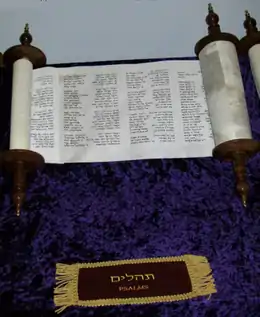Psalm 44
Psalm 44 is the 44th psalm from the Book of Psalms, composed by sons of Korah and is classified in the series of lamentations of the people. In the Greek Septuagint version of the bible, and in its Latin translation in the Vulgate, this psalm is Psalm 43 in a slightly different numbering system.
Structure

Usually, the Psalm is organized as follows:[1][2][3]
- V. 2-9: Healing Historical Review.
- from 10-23: describing the current disaster.
- V. 24-27: Final request for termination of the disaster through the intervention of God.
Another scheme for organizing Psalm 44 has been suggested as follows[4] (using English versification):
- Remembering that God performed mighty deeds in the past for his people (vv. 1-3)
- Desiring God to perform mighty deeds now (vv. 4-8)
- Lamenting God’s recent chastening of his people (vv. 9-16)
- Appealing to God that his chastening is not a result of their sin (vv. 17-22)
- Calling on God to again engage in his mighty deeds on their behalf (vv. 23-26)
As a central message of the psalm Hermann Gunkel noted the contrast between past and present events.[5]
In Jewish traditions, its viewed as suffering in the face of the golden past, all the more shows the plight of the current situation.
Setting
The reference to scattering the Israelites among the nations in verse 11 could point to a date after the Babylonian exile. However, some have noted that the reference to God not going out with their armies in verse 9 would indicate that Israel still had standing armies at the time of the writing of Psalm 44 and thus the setting of the psalm would need to be before Judah's exile to Babylon. In addition, the psalmist's insistence in verses 17 and 18 that their plight was not due to national sin is further confirmation that the psalmist is not referring to a time after the Babylonian exile.[4]
Uses
Judaism
- Verse 9 is found in the repetition of the Amidah during Rosh Hashanah.[6][7]
- Parts of verses 14 and 23 form a verse found in the long Tachanun recited on Mondays and Thursdays.[8]
- Verse 27 is the sixth verse of Hoshia Et Amecha in Pesukei Dezimra.[9]
New Testament
Verse 22 is referenced by the Apostle Paul in the New Testament book "the Epistle to the Romans 8:36"[10] in the context of realities that can make Christians think that they are separated from God's love.
Literary form
Psalm 44 is a Psalm of communal lament, indicating that the suffering, in this case from being defeated by enemies, is communal.[11]
This Psalm reflects each of five key elements[12] of a lament, or complaint, Psalm:
- Address: Verse 1
"We have heard with our ears, O God, our ancestors have told us, what deeds you performed in their days, in the days of old" (44:1) In this case, the Psalmist is speaking directly to God.
- Complaint: verses 9-16, 17-19
In these verses, the Psalmist laments that God has been slow to act and has a responsibility to save these people from their enemies.
- Statement of trust in the reliability of God as known by the Psalmist or community: verses 4-8
The Psalmist recites a history of God's saving acts, which includes reference to God commanding victories for Jacob.
- Petition for God's active intervention: verses 23-26
These petitions can be quite specific. In verse 26, the Psalmist gives a direct command to God to "Rise up, come to our help."
- Vow of Thanksgiving: verse 8
This particular Psalm includes a brief vow of thanksgiving in verse 8, when the Psalmist writes "In God we have boasted continually, and we will give thanks to your name forever" (44:8)
A note about superscripts
Its superscript reads "To the Leader. Of the Korahites. A Maskil". It is addressed to the leader of the Korahites, who were likely a group of people who played a role in the music or worship of the temple. The term "Maskil" means "artistic song" and its inclusion in the superscript of this Psalm indicates that it was originally written with artistic skill.
References
- So von Gianfranco Ravasi: Il libro dei Salmi. Bd. I, (Bologna 1981), p. 782.
- Erich Zenger: Die Psalmen I. Psalm 1–50 Echter-Verlag, (Würzburg 1993), p271,
- Peter Craigie: Psalms 1–50., (Waco 1983), p332.
- "Psalm 44 Message / Psalm 44 Commentary / Psalm 44 Sermon". Explaining the Book. 2018-01-24. Retrieved 2018-03-02.
- Hermann Gunkel: Die Psalmen, (61986), S. 186.
- The Complete Artscroll Machzor for Rosh Hashanah page 351
- D’après le Complete Artscroll Siddur, compilation des prières juives.
- The Complete Artscroll Siddur, page 133
- The Complete Artscroll Siddur, page 64
- Kirkpatrick, A. F. (1901). The Book of Psalms: with Introduction and Notes. The Cambridge Bible for Schools and Colleges. Book IV and V: Psalms XC-CL. Cambridge: At the University Press. p. 839. Retrieved February 28, 2019.
- Michael D. Coogan, A Brief Introduction to the Old Testament (New York: Oxford, 2009), 370
- "Lament Psalm Structure". Explaining the Book. 2017-06-03. Retrieved 2018-03-02.
External links
| Wikimedia Commons has media related to Psalm 44. |